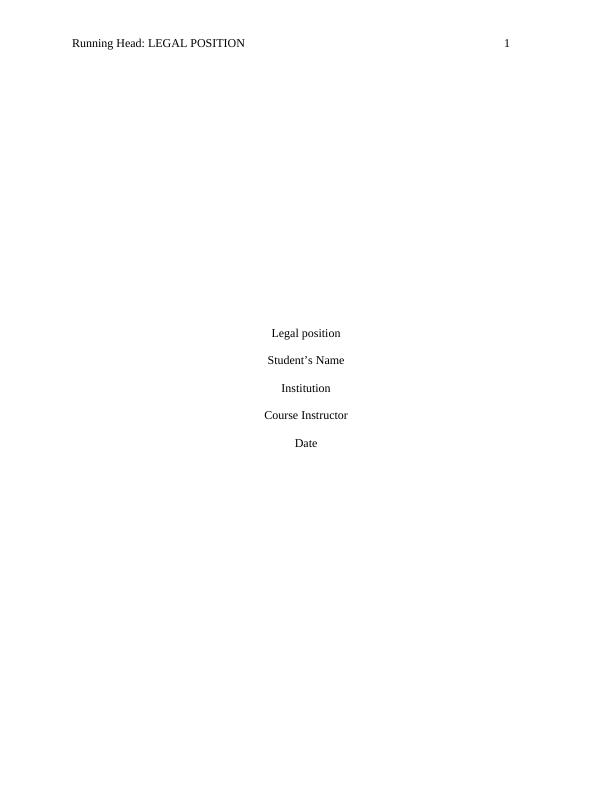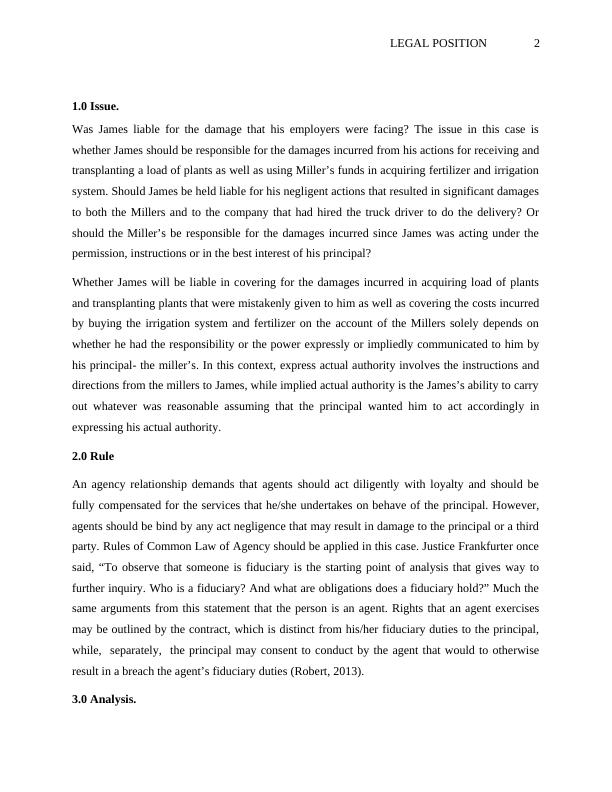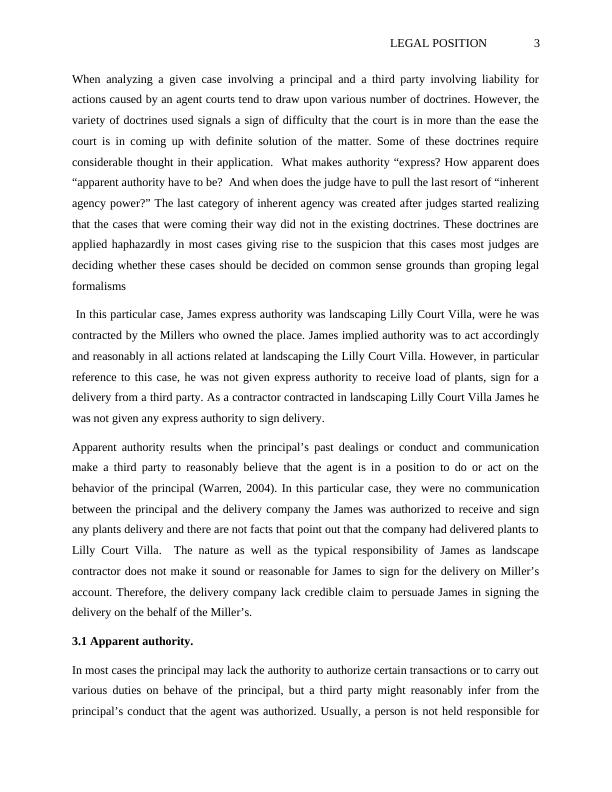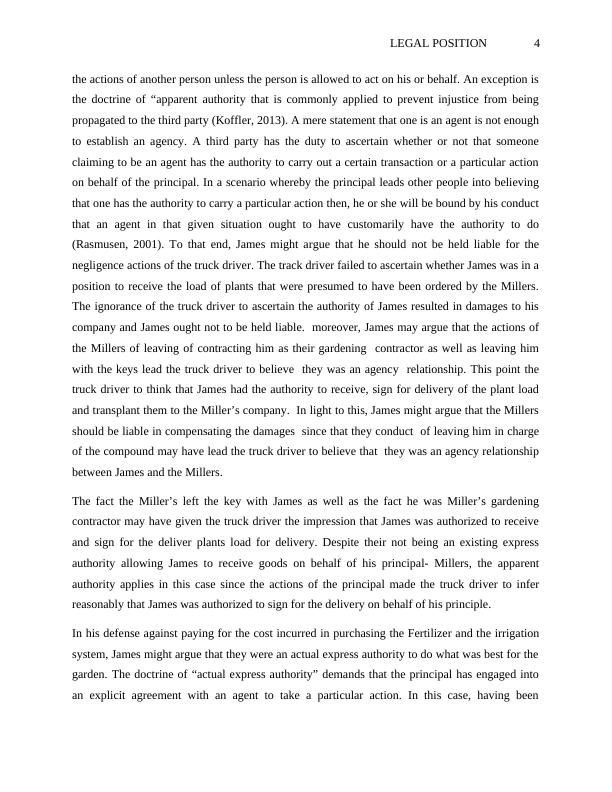Legal Position
Added on 2023-04-21
11 Pages4314 Words398 Views
Running Head: LEGAL POSITION 1
Legal position
Student’s Name
Institution
Course Instructor
Date
Legal position
Student’s Name
Institution
Course Instructor
Date

LEGAL POSITION 2
1.0 Issue.
Was James liable for the damage that his employers were facing? The issue in this case is
whether James should be responsible for the damages incurred from his actions for receiving and
transplanting a load of plants as well as using Miller’s funds in acquiring fertilizer and irrigation
system. Should James be held liable for his negligent actions that resulted in significant damages
to both the Millers and to the company that had hired the truck driver to do the delivery? Or
should the Miller’s be responsible for the damages incurred since James was acting under the
permission, instructions or in the best interest of his principal?
Whether James will be liable in covering for the damages incurred in acquiring load of plants
and transplanting plants that were mistakenly given to him as well as covering the costs incurred
by buying the irrigation system and fertilizer on the account of the Millers solely depends on
whether he had the responsibility or the power expressly or impliedly communicated to him by
his principal- the miller’s. In this context, express actual authority involves the instructions and
directions from the millers to James, while implied actual authority is the James’s ability to carry
out whatever was reasonable assuming that the principal wanted him to act accordingly in
expressing his actual authority.
2.0 Rule
An agency relationship demands that agents should act diligently with loyalty and should be
fully compensated for the services that he/she undertakes on behave of the principal. However,
agents should be bind by any act negligence that may result in damage to the principal or a third
party. Rules of Common Law of Agency should be applied in this case. Justice Frankfurter once
said, “To observe that someone is fiduciary is the starting point of analysis that gives way to
further inquiry. Who is a fiduciary? And what are obligations does a fiduciary hold?” Much the
same arguments from this statement that the person is an agent. Rights that an agent exercises
may be outlined by the contract, which is distinct from his/her fiduciary duties to the principal,
while, separately, the principal may consent to conduct by the agent that would to otherwise
result in a breach the agent’s fiduciary duties (Robert, 2013).
3.0 Analysis.
1.0 Issue.
Was James liable for the damage that his employers were facing? The issue in this case is
whether James should be responsible for the damages incurred from his actions for receiving and
transplanting a load of plants as well as using Miller’s funds in acquiring fertilizer and irrigation
system. Should James be held liable for his negligent actions that resulted in significant damages
to both the Millers and to the company that had hired the truck driver to do the delivery? Or
should the Miller’s be responsible for the damages incurred since James was acting under the
permission, instructions or in the best interest of his principal?
Whether James will be liable in covering for the damages incurred in acquiring load of plants
and transplanting plants that were mistakenly given to him as well as covering the costs incurred
by buying the irrigation system and fertilizer on the account of the Millers solely depends on
whether he had the responsibility or the power expressly or impliedly communicated to him by
his principal- the miller’s. In this context, express actual authority involves the instructions and
directions from the millers to James, while implied actual authority is the James’s ability to carry
out whatever was reasonable assuming that the principal wanted him to act accordingly in
expressing his actual authority.
2.0 Rule
An agency relationship demands that agents should act diligently with loyalty and should be
fully compensated for the services that he/she undertakes on behave of the principal. However,
agents should be bind by any act negligence that may result in damage to the principal or a third
party. Rules of Common Law of Agency should be applied in this case. Justice Frankfurter once
said, “To observe that someone is fiduciary is the starting point of analysis that gives way to
further inquiry. Who is a fiduciary? And what are obligations does a fiduciary hold?” Much the
same arguments from this statement that the person is an agent. Rights that an agent exercises
may be outlined by the contract, which is distinct from his/her fiduciary duties to the principal,
while, separately, the principal may consent to conduct by the agent that would to otherwise
result in a breach the agent’s fiduciary duties (Robert, 2013).
3.0 Analysis.

LEGAL POSITION 3
When analyzing a given case involving a principal and a third party involving liability for
actions caused by an agent courts tend to draw upon various number of doctrines. However, the
variety of doctrines used signals a sign of difficulty that the court is in more than the ease the
court is in coming up with definite solution of the matter. Some of these doctrines require
considerable thought in their application. What makes authority “express? How apparent does
“apparent authority have to be? And when does the judge have to pull the last resort of “inherent
agency power?” The last category of inherent agency was created after judges started realizing
that the cases that were coming their way did not in the existing doctrines. These doctrines are
applied haphazardly in most cases giving rise to the suspicion that this cases most judges are
deciding whether these cases should be decided on common sense grounds than groping legal
formalisms
In this particular case, James express authority was landscaping Lilly Court Villa, were he was
contracted by the Millers who owned the place. James implied authority was to act accordingly
and reasonably in all actions related at landscaping the Lilly Court Villa. However, in particular
reference to this case, he was not given express authority to receive load of plants, sign for a
delivery from a third party. As a contractor contracted in landscaping Lilly Court Villa James he
was not given any express authority to sign delivery.
Apparent authority results when the principal’s past dealings or conduct and communication
make a third party to reasonably believe that the agent is in a position to do or act on the
behavior of the principal (Warren, 2004). In this particular case, they were no communication
between the principal and the delivery company the James was authorized to receive and sign
any plants delivery and there are not facts that point out that the company had delivered plants to
Lilly Court Villa. The nature as well as the typical responsibility of James as landscape
contractor does not make it sound or reasonable for James to sign for the delivery on Miller’s
account. Therefore, the delivery company lack credible claim to persuade James in signing the
delivery on the behalf of the Miller’s.
3.1 Apparent authority.
In most cases the principal may lack the authority to authorize certain transactions or to carry out
various duties on behave of the principal, but a third party might reasonably infer from the
principal’s conduct that the agent was authorized. Usually, a person is not held responsible for
When analyzing a given case involving a principal and a third party involving liability for
actions caused by an agent courts tend to draw upon various number of doctrines. However, the
variety of doctrines used signals a sign of difficulty that the court is in more than the ease the
court is in coming up with definite solution of the matter. Some of these doctrines require
considerable thought in their application. What makes authority “express? How apparent does
“apparent authority have to be? And when does the judge have to pull the last resort of “inherent
agency power?” The last category of inherent agency was created after judges started realizing
that the cases that were coming their way did not in the existing doctrines. These doctrines are
applied haphazardly in most cases giving rise to the suspicion that this cases most judges are
deciding whether these cases should be decided on common sense grounds than groping legal
formalisms
In this particular case, James express authority was landscaping Lilly Court Villa, were he was
contracted by the Millers who owned the place. James implied authority was to act accordingly
and reasonably in all actions related at landscaping the Lilly Court Villa. However, in particular
reference to this case, he was not given express authority to receive load of plants, sign for a
delivery from a third party. As a contractor contracted in landscaping Lilly Court Villa James he
was not given any express authority to sign delivery.
Apparent authority results when the principal’s past dealings or conduct and communication
make a third party to reasonably believe that the agent is in a position to do or act on the
behavior of the principal (Warren, 2004). In this particular case, they were no communication
between the principal and the delivery company the James was authorized to receive and sign
any plants delivery and there are not facts that point out that the company had delivered plants to
Lilly Court Villa. The nature as well as the typical responsibility of James as landscape
contractor does not make it sound or reasonable for James to sign for the delivery on Miller’s
account. Therefore, the delivery company lack credible claim to persuade James in signing the
delivery on the behalf of the Miller’s.
3.1 Apparent authority.
In most cases the principal may lack the authority to authorize certain transactions or to carry out
various duties on behave of the principal, but a third party might reasonably infer from the
principal’s conduct that the agent was authorized. Usually, a person is not held responsible for

LEGAL POSITION 4
the actions of another person unless the person is allowed to act on his or behalf. An exception is
the doctrine of “apparent authority that is commonly applied to prevent injustice from being
propagated to the third party (Koffler, 2013). A mere statement that one is an agent is not enough
to establish an agency. A third party has the duty to ascertain whether or not that someone
claiming to be an agent has the authority to carry out a certain transaction or a particular action
on behalf of the principal. In a scenario whereby the principal leads other people into believing
that one has the authority to carry a particular action then, he or she will be bound by his conduct
that an agent in that given situation ought to have customarily have the authority to do
(Rasmusen, 2001). To that end, James might argue that he should not be held liable for the
negligence actions of the truck driver. The track driver failed to ascertain whether James was in a
position to receive the load of plants that were presumed to have been ordered by the Millers.
The ignorance of the truck driver to ascertain the authority of James resulted in damages to his
company and James ought not to be held liable. moreover, James may argue that the actions of
the Millers of leaving of contracting him as their gardening contractor as well as leaving him
with the keys lead the truck driver to believe they was an agency relationship. This point the
truck driver to think that James had the authority to receive, sign for delivery of the plant load
and transplant them to the Miller’s company. In light to this, James might argue that the Millers
should be liable in compensating the damages since that they conduct of leaving him in charge
of the compound may have lead the truck driver to believe that they was an agency relationship
between James and the Millers.
The fact the Miller’s left the key with James as well as the fact he was Miller’s gardening
contractor may have given the truck driver the impression that James was authorized to receive
and sign for the deliver plants load for delivery. Despite their not being an existing express
authority allowing James to receive goods on behalf of his principal- Millers, the apparent
authority applies in this case since the actions of the principal made the truck driver to infer
reasonably that James was authorized to sign for the delivery on behalf of his principle.
In his defense against paying for the cost incurred in purchasing the Fertilizer and the irrigation
system, James might argue that they were an actual express authority to do what was best for the
garden. The doctrine of “actual express authority” demands that the principal has engaged into
an explicit agreement with an agent to take a particular action. In this case, having been
the actions of another person unless the person is allowed to act on his or behalf. An exception is
the doctrine of “apparent authority that is commonly applied to prevent injustice from being
propagated to the third party (Koffler, 2013). A mere statement that one is an agent is not enough
to establish an agency. A third party has the duty to ascertain whether or not that someone
claiming to be an agent has the authority to carry out a certain transaction or a particular action
on behalf of the principal. In a scenario whereby the principal leads other people into believing
that one has the authority to carry a particular action then, he or she will be bound by his conduct
that an agent in that given situation ought to have customarily have the authority to do
(Rasmusen, 2001). To that end, James might argue that he should not be held liable for the
negligence actions of the truck driver. The track driver failed to ascertain whether James was in a
position to receive the load of plants that were presumed to have been ordered by the Millers.
The ignorance of the truck driver to ascertain the authority of James resulted in damages to his
company and James ought not to be held liable. moreover, James may argue that the actions of
the Millers of leaving of contracting him as their gardening contractor as well as leaving him
with the keys lead the truck driver to believe they was an agency relationship. This point the
truck driver to think that James had the authority to receive, sign for delivery of the plant load
and transplant them to the Miller’s company. In light to this, James might argue that the Millers
should be liable in compensating the damages since that they conduct of leaving him in charge
of the compound may have lead the truck driver to believe that they was an agency relationship
between James and the Millers.
The fact the Miller’s left the key with James as well as the fact he was Miller’s gardening
contractor may have given the truck driver the impression that James was authorized to receive
and sign for the deliver plants load for delivery. Despite their not being an existing express
authority allowing James to receive goods on behalf of his principal- Millers, the apparent
authority applies in this case since the actions of the principal made the truck driver to infer
reasonably that James was authorized to sign for the delivery on behalf of his principle.
In his defense against paying for the cost incurred in purchasing the Fertilizer and the irrigation
system, James might argue that they were an actual express authority to do what was best for the
garden. The doctrine of “actual express authority” demands that the principal has engaged into
an explicit agreement with an agent to take a particular action. In this case, having been

End of preview
Want to access all the pages? Upload your documents or become a member.
Related Documents
Case Study on Legal Positionlg...
|13
|4536
|290
chapter 4 law of agency PDFlg...
|11
|1239
|274
Roles and Duties of Agents in Business Lawlg...
|10
|3930
|155
Legal Aspects of Business Assignment Solvedlg...
|10
|3018
|363
Agency Authoritylg...
|7
|1131
|100
Agency Law and Liability: A Case Study on Steve and Biancalg...
|6
|1943
|301
